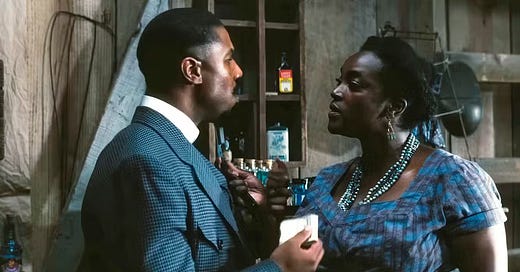Sinners Clocked The Meaning Of Who & How Black Men Choose
"... but won’t steal this pussy for a night?"
If you haven’t seen Sinners, the new horror flick written and directed by Ryan Coogler, and starring Michael B. Jordan playing two roles as twins, you need to. It’s masterfully shot and has a lot to say about Black traditions, Black art, Black spirituality, and perhaps most importantly, Black ownership. It’s social commentary masked as a vampire movie, in the same tradition of Jordan Peele’s 2017 directorial debut Get Out. Get ready for the thinkpieces because there were so many layers of symbolism and meaning to unpack throughout the film.
When Black men take on the task of expressing and investigating Blackness, I’m always anxious to see how gender and sexuality fit into their narrative. How are women imagined in their proximity to Black men, and Black community in general? Do they have the range for an intersectional analysis or are they relying on tropes and archetypes that only reinforce male dominance? I don’t always love the answers I find. But with Sinner’s, Coogler flipped some of those tropes on their heads and used others to make important points.
[SPOILER’S AHEAD! Bookmark this and come back later if you still haven’t seen it.]
At the center of this supernatural period piece are outlaw twins Smoke and Stack. It’s 1931 and they’ve returned to their hometown in Mississippi after seven years away (first in WWI, then in Chicago, a place where the violent racism of the Jim Crow era simply takes on a different form) to open a juke joint. Their lore precedes them in their Southern community, and as they go about separately making plans for their grand opening, we meet the townsfolk who played a part in their origins, including the women they love.
We first meet Annie, played by Wunmi Mosaku, as Smoke delivers flowers to the burial site of his baby. Nigerian-born Mosaku is already a stallion, and her full-figure was made even more imposing by the sheer power of her performance. Annie takes up space as a thick, dark-skinned hoodoo practitioner, and at first I feared that we were being introduced to a magical mammy figure whose only concern is the safety of the man in front of her. I didn’t know if she was his mother, his aunt, a sister, or the woman from down the road who used to babysit Smoke and Stack when they were kids, all roles that are usually reserved for women who look like her. Instead, Annie is the mother of the child that Smoke is still grieving, and she’s pissed at her baby daddy for leaving her to mourn alone. They bicker. About her work, about his absence, about everything except the sexual tension that still exists between them. It gets so heated that Annie puts a knife to his throat. But within minutes, the blade is replaced by her bare hand, as it travels sensually from his crotch to his throat. She whispers in his ear, “Your body hasn't forgotten me.” (Annie choking Smoke will be my screensaver by week’s end.*) Then she’s bent over and they’re having the fabled baby-daddy / baby-mama sex that apparently hits like crack and leaves all forgiven.
Unfortunately, there’s a world where a character like Annie is written to get her back blown out and then left alone once more, only consulted again when Smoke needs to know how to eradicate vampires. As the level-headed, business oriented twin, his growth could have been marked by his procurement of a less complicated, more palatable lover. But Coogler’s decision to instead make Annie (with all of her sage wisdom and knowledge about spirits and other entities) a major part of the plot shapes Smoke and his arc. Despite being a soldier, a killer, and criminal, he is tethered to a family he never got to have, one he doesn’t feel he deserves but still yearns for. She is not his self-sacrificial martyr. She did not go chasing after him, comfortable with what she has with or without him. She prayed for him while he was gone, whether Smoke believes in it or not, because that’s just what she does. She is not his savior. But Annie’s love for him, his for her, and their shared love for the infant they lost are ultimately Smoke’s salvation. When our hero meets his fate, dying by the gun just as he lived by it, it’s that family waiting for him on the other side. They’re his final slice of solace.
Smoke’s brother, Stack, is the twin with the slick mouth, a snake oil salesman, always trying to skim a little bit more off the top. He suffers an alternate fate and some of it is certainly attributed to his vastly different choice of paramour.
Keep reading with a 7-day free trial
Subscribe to Notes From A Trap Feminist to keep reading this post and get 7 days of free access to the full post archives.





